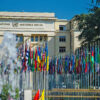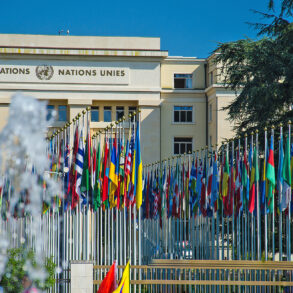Becoming part of the solution
“While many of them – in sub-Saharan Africa, the Indian subcontinent or Southeast Asia – have long suffered from extreme weather events, others – such as oil-producing states as well as the emerging, consumerist Muslim middle class – contribute to them.”
Accompanied by protests, the UN Climate Summit in Glasgow (COP26) came to an end on 12 November 2021. While the summit president issued the optimistic slogan “We can” at the end, hundreds of delegates marched through the building demonstrating for “climate justice.” Muslims in Great Britain, the USA or Indonesia have been dealing more intensively with climate change and its consequences for a long time. Physicist Harald Lesch showed at the German TV how enormous the task is. According to Lesch, there is a kind of “obesity” when it comes to raw energy, which is necessary for all processes. The challenge cannot be met with new technologies alone.
In terms of emissions of the climate-damaging gases CO2 and methane, there is no longer any sign of the decline caused by the pandemic. The NGO Germanwatch assumes that the “values of 2019” will be exceeded again in the near future. In particular, the 20 largest industrialised nations of the G20 have a huge share of the emissions. They are responsible for around 75 per cent. While classic industrial nations such as Italy, France, Great Britain or Germany have set themselves ambitious goals such as a phase-out of coal-fired power generation by 2030, it is emerging countries and classic carbon dioxide producers that are responsible for current and future increases. In China and India in particular, an unbelievable number of new coal-fired power plants are planned by German standards.
Despite what was decided in Glasgow and what can be realised against enormous opposition, experts of the Intergovernmental Panel on Climate Change (IPCC) were sceptical. According to the scientific journal Nature in August of last year, about 60 percent of the researchers surveyed believed the earth‘s temperature would increase by three degrees by the end of the century in relation to the pre-industrial period. Only 20 percent were optimistic that a limit of two degrees would be possible. According to the International Energy Agency, the Glasgow announcements would result in global warming of 1.8 degrees if adhered to. “This is a big step forward, but much more is needed,” said its head Birol.
Part of the drama and real injustice of the climate crisis is that those who historically and currently contribute least to it are paying the highest price. Specifically, this affects people in Africa – especially sub-Saharan Africa – or in places like Pakistan. Here, climate and weather patterns have changed in recent years, leading to more droughts, periods of heat, but also storm surges and floods.
The increasingly volatile weather events not only cause an increase in “natural disasters,” they also make the livelihoods of many people more difficult. Namely, they increase political insecurity, refugee movements, economic losses and a decrease in food security. This point was raised already in 2021 by the head of the Berlin office of the World Food Programme (WFP), Dr Martin Frick. He warned “of the catastrophic consequences of the climate crisis for world hunger.” 811 million people were already suffering from hunger. If global warming increases by two degrees, the World Food Programme expects another 189 million people to go hungry.
In a year that saw record temperatures in parts of the world, unusual cold snaps, the Ahr Valley in Germany washed away, and some regions oscillate between droughts and floods, there is no globally significant group that is not both actor and affected by the climate crisis. This includes many Muslims around the world. While many of them – in sub-Saharan Africa, the Indian subcontinent or Southeast Asia – have long suffered from extreme weather events, others – such as the oil-producing states and the emerging, consumerist Muslim middle class – contribute to them. It falls short of seeing members of religious communities exclusively in categories such as “victims” and “perpetrators.”
According to a study edited by Jens Koehrsen, who works at the Centre for Religion, Economics and Politics at the University of Basel, there is growing evidence on the role of religion in understanding and approaching the climate crisis. Although Muslims are the second largest religious group worldwide, little has been known in the past about their positions on climate change. There is potential here.
For example, religious leaders and organisations often enjoy a high level of credibility. They have an important voice in debates and can influence political decision-making processes through their networks. Moreover, institutions have financial and organisational resources that they can mobilise to initiate a transformation towards more environmentally friendly, sustainable societies. Scholars of religion hint at an interesting aspect: they speak of an ongoing “greening” process among religions. By this they mean that religious traditions become more ecologically aware and active over time.
Muslims have developed different strategies to deal with the phenomenon. A current minority is engaged in public awareness campaigns, wants CO2 reductions through socio-technological efforts and is committed to questioning Islamic teachings in terms of climate friendliness. A numerically larger group in various parts of the world sees global warming as a divine reaction and punishment for their own wrongdoing. And finally, a smaller segment involved in discussing the issue suspect climate activism to be a “plot by the West.”
Survey data from 2018 found that many Muslim leaders around the world see climate change as an important social challenge. The researchers surveyed 150 influential people from North Africa, the Middle East, the EU, the US, Asia and the successor states of the Soviet Union. However, persistent economic challenges in Muslim-majority states and poverty would drive populations to focus on growth and poverty reduction and alleviation.
Muslim environmental activists refer to the Qur’an and Sunnah as the main sources for developing ecological principles. In doing so, they create an interpretation of the teachings and formulate an Islamic environmental ethic. At the same time, the core concepts are by no means the same for all of them. For most of them, however, the concepts of tauhid and khalifa are determinative. In addition, there are two further concepts: Mizan and Maslahah. Tauhid – the unity of the divine – is interpreted as the unity of creation, including man and nature. Mizan – balance – stands for a balanced relationship between all creatures. Khalifa – relating to man – sees man as the trustee of Allah on earth. And Maslahah – common good – refers to prudence and care for future generations.
For many Muslims active in environmental protection and climate justice, it is no longer enough to rely solely on the sources and possible interpretations for more environmental awareness among the faithful. They are relying on their outreach to the communities to increase awareness and action internally.
In parallel with the start of the Glasgow Summit, the UK’s leading Muslim organisations and scholars spoke out with an unequivocal statement. “We must act now if we are to ensure that we leave a liveable earth for future generations and be guided by the Qur’an and Sunnah which show us the way,” the text said. If sustainable development is to have any chance of working for the benefit of the poorer part of humanity, “the more fortunate among us must reduce our impact” on the earth’s natural systems. In their call, the authors follow the landmark Islamic Declaration on Global Climate Change from 2015.
Muslims want to act now and change practical behaviour towards climate friendliness. The veteran among the projects is the British Islamic Foundation for Ecological and Environmental Sciences (IFEES), launched by husband-and-wife team Fazlun and Saba Khalid. After extensive years of research, the foundation has implemented local ecological and climate-friendly projects all over the world in cooperation with the population and religious leaders.
They have inspired a new generation of climate-conscious environmental activists around the world. These can be found in the Green Deen movement from the USA and Great Britain, which shows mosques how to organise climate-friendly iftars. In Germany, there is the NourEnergy project, which helps religious communities, among others, to make their buildings and operations sustainable.
The beginnings have been made and the necessary foundation laid for more climate-friendly behaviour. Now, Muslims around the world are faced with the task of adapting their existence in the world accordingly.











